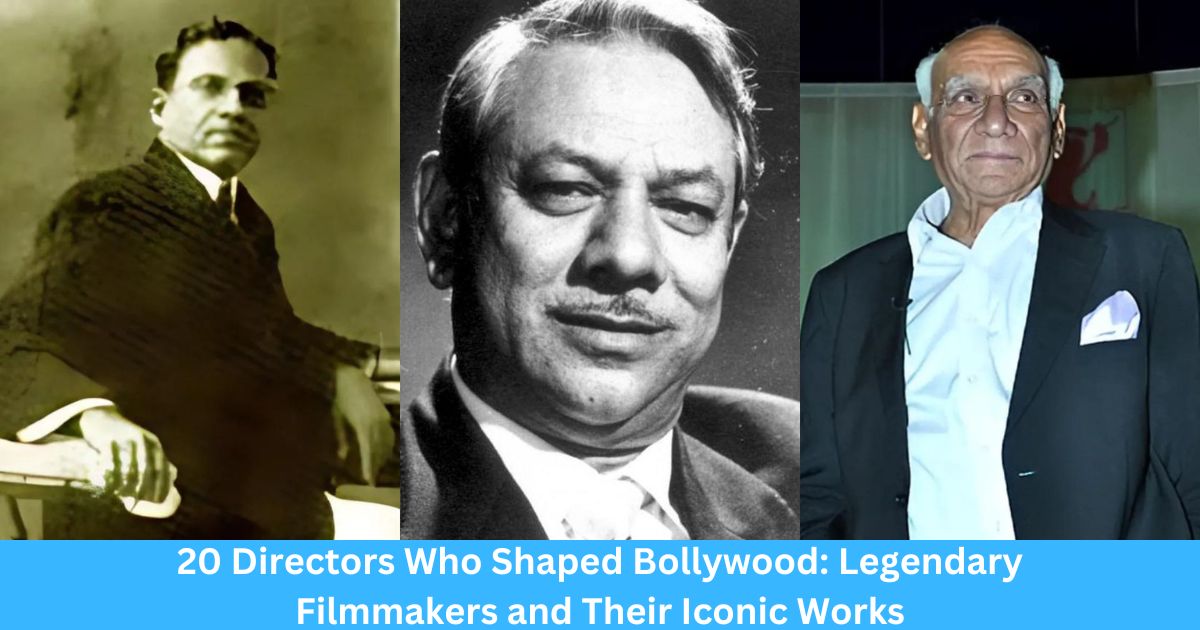Bollywood, which is in the spirit of Indian cinema, has experienced many brilliant, impactful directors who have immortalized unforgettable stories on film. The collective impact they reach audiences across India and the world. Here are 20 legendary filmmakers who have contributed significantly to the history of film in Bollywood.
1. Raja Harishchandra – Dadasaheb Phalke
Bollywood was initiated by Dadasaheb Phalke, the founder and father of Indian cinema. His film Raja Harishchandra (1913) was the first silent feature film made in India that marked the beginning of cinema.
2. Mehboob Khan – Mother India (1957)
Mehboob Khan’s Mother India is easily one of the greatest films in Indian cinema history. It is a story about a mother’s enduring sacrifices, hardships, and perseverance presented in the story with heartfelt portrayals and dramatic symbolism – the story quotably defined the soul of the nation. It remains a classic today.
3. Raj Kapoor – Awaara (1951)
Raj Kapoor, affectionately known as “The Showman of Indian Cinema” developed his own films about family, love and social justice that uniquely reflected many aspects of those social ideologies. Awaara is perhaps the most easily remembered classic by Kapoor with a classic, timeless, evergreen story, and notable music.
4. Guru Dutt – Pyaasa (1957)
Guru Dutt’s films expressed emotional and poetic storytelling, and Pyaasa is perhaps regarded as a poetic film but much of his work illustrated brilliant artistic expressionism because his work incorporated melodrama and film that articulated meaning with story.
5. Bimal Roy – Do Bigha Zamin (1953)
Bimal Roy was masterfully skilled in the art of realism. Do Bigha Zamin prompted audiences into the troubled struggles of the common man’s socio economic issues. His characters grappled with social issues driven by circumstance and morality, prominent today.
6. Yash Chopra – Kabhi Kabhie (1976)
Yash Chopra was the romantic film king of Bollywood and was awarded many times for his work. Like Coleman, Chopra’s films were a spectacle to witness; and his romantic masterpieces poetic love and romance, like Kabhi Kabhie, Dil To Pagal Hai and Chandni epitomized love and emotions that reflect the human spirit/experience.
7. Hrishikesh Mukherjee – Anand (1971)
Hrishikesh Mukherjee’s stories were simplistic yet charming and heartwarming films, closely resembling the fabric of life experiences with unique clever humor or emotional response; which are loved by ALL generations. Mukherjee is celebrated for his work articulating the lifetime of ordinary people with simple yet meaningful stories, clever humor, emotional sensitivity,
8. Manmohan Desai – Amar Akbar Anthony (1977)
Manmohan Desai is widely known for his grand cinema. His works, such as Amar Akbar Anthony, were masala entertainers reflecting a family and community ethos.
9. Ramesh Sippy – Sholay (1975)
Ramesh Sippy’s Sholay forever changed the benchmark for action, drama, and storytelling in Bollywood and is considered to be the greatest Indian film.
10. Shyam Benegal – Ankur (1974)
Shyam Benegal is a leader of Parallel Cinema. Ankur received critical acclaim as a film of social significance about rural life and is an example of a film that continues to inspire realistic filmmakers.
11. Subhash Ghai – Karz (1980)
Subhash Ghai was known for his grand vision and dramatic storytelling. Karz and Taal brought operatic overtones to Bollywood with larger-than-life characters and narratives with depth.
12. Satyajit Ray – Pather Panchali (1955)
Though often recognized in relation to Bengali cinema, one cannot ignore Ray’s significance in Bollywood. His first film Pather Panchali is an incredible Indian film recognized across the globe.
13. Karan Johar – Kabhi Khushi Kabhie Gham (2001)
Karan Johar is often credited with modern-day Bollywood blockbuster mega multi-starrer family dramas. Kabhi Khushi Kabhie Gham and My Name is Khan are fantastic examples of dramatic emotion and mega.
14. Ramesh Behl – Kasme Vaade (1978)
Ramesh Behl was a filmmaker who gave us entertaining films in the 70s and 80s, full of high emotion, family drama, and dramatic performance. An example is Kasme Vaade.
15. Vishal Bhardwaj – Maqbool (2003)
Vishal Bhardwaj’s adaptation of literary canon and playwrights like Shakespeare are very appealing. Maqbool, an adaptation of Macbeth, is a perfect example of Bhardwaj’s narrative abilities.
16. Rajkumar Hirani – 3 Idiots (2009)
The films of Rajkumar Hirani, including 3 Idiots and PK, balance social commentary and a positive and heartfelt message with humor and emotion.
17. Anurag Kashyap – Gangs of Wasseypur (2012)
The work of Anurag Kashyap is raw, grimy, and realistic as in Gangs of Wasseypur. This has influenced a new wave of directors in Indian cinema making him a cult figure.
18. Zoya Akhtar – Zindagi Na Milegi Dobara (2011)
Filmmaker Zoya Akhtar introduced a new experience in Bollywood with the subject matter on relationships, generational ideals, and self-discovery experienced in the film, Zindagi Na Milegi Dobara.
19. Farhan Akhtar – Dil Chahta Hai (2001)
Debut film Dil Chahta Hai by Farhan Akhtar framed the re-examination of friendship and modern relationships in Indian films leaving notable legacies on future urban youth.
20. Sanjay Leela Bhansali – Devdas (2002)
Known for richness and visual grandeur, Sanjay Leela Bhansali’s Devdas may be a spectacle of filmmaking. His visual extravagance is filled with lush sets, fine detail, and packed with emotional tension.

